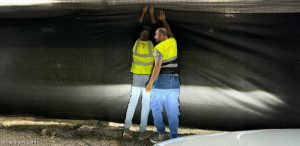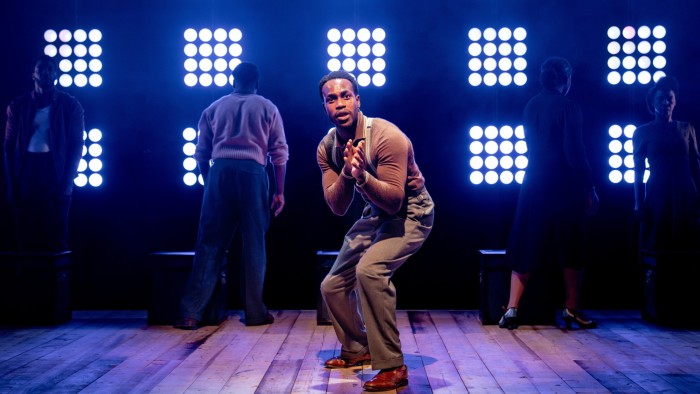Summarize this content to 2000 words in 6 paragraphs in Arabic Unlock the Editor’s Digest for freeRoula Khalaf, Editor of the FT, selects her favourite stories in this weekly newsletter.There’s a wordless passage in Roy Williams’ cracking adaptation of The Lonely Londoners when Henry (nicknamed “Galahad”), newly arrived in 1950s London from Trinidad, sets out to look for work. Dapper in his trilby, he trips jauntily down the street to a ska soundtrack, eagerly spotting landmarks, greeting passers-by, seeking directions — only to be repeatedly knocked back and knocked down by individuals we don’t see but can guess at.It’s a vivid, potent sequence: an example of how to translate a novel into vibrant stage language using music, movement and a body in the space. But it also drives to the heart of Sam Selvon’s celebrated 1956 novel about the Windrush generation. Selvon chronicles the experiences of a group of young men and women who arrive in the “mother country” hoping for work and welcome, but find a cold, clenched place, rife with prejudice and hostility. The book was groundbreaking in its use of creolised language, its lyrical style and free-flowing structure. In the hands of Williams, director Ebenezer Bamgboye and movement director Nevena Stojkov, that musical lilt infuses the staging (first seen at Jermyn Street Theatre last year), which is fluid, restless and punctuated by expressively choreographed passages. Perhaps the most moving of these comes near the end of the show, when the four main men — Moses, Lewis, “Big City” and Galahad — repeatedly fall, lift and support each other. “We are lonely, yes,” says Moses, mentor to newcomers off the boat. “But we are not alone!”Played with great charisma by Solomon Israel, Moses is the linchpin of the evening — guide to the city for the men, guide to events for us. He’s often the peacemaker, dispensing cigarettes and calm. But his despair at being no further on after 10 years in Britain sometimes rises to the surface, not least in his poignant disclosure of the letters he has written, but not sent, to a seven-year-old son in Trinidad — a son he has never seen but who haunts him, together with the woman he abandoned. Humour, pathos and rage twine around one another throughout the show, beautifully expressed in the cast’s superb, rich performances. “Big City” (Gilbert Kyem Jnr) is a source of comedy for his frequent mispronunciation of place names (“Ladbreek Grave” for “Ladbroke Grove”), but he becomes so worn down and angry that he gets entangled in a foolish heist. Lewis (Tobi Bakare) develops a dangerous and irrational jealousy of his wife Agnes (Shannon Hayes). And we watch the spark go out of young Galahad (Romario Simpson) until, in the most painful, harrowing moment in the show, he rails against the colour of his own skin.With bursts of anachronistic music and sudden blasts of light, Bamgboye keeps an edge to the production, steering away from nostalgia. Meanwhile the actors sit quietly on luggage boxes between scenes, emphasising their uncertain state, their desire to belong and their love for the place despite everything. It’s overlong and sometimes the switches between time-periods are confusing and unclear. But it’s a terrific, moving show and, like A Good House at the Royal Court, it’s a sharp and salient reminder of the endemic nature of prejudice. ★★★★☆To February 22, kilntheatre.com
rewrite this title in Arabic The Lonely Londoners review — vivid portrait of young Trinidadians adrift in a cold ‘mother country’
مقالات ذات صلة
مال واعمال
مواضيع رائجة
النشرة البريدية
اشترك للحصول على اخر الأخبار لحظة بلحظة الى بريدك الإلكتروني.
© 2025 جلوب تايم لاين. جميع الحقوق محفوظة.





